Related Research Articles

The Jnanpith Award is the oldest and the highest Indian literary award presented annually by the Bharatiya Jnanpith to an author for their "outstanding contribution towards literature". Instituted in 1961, the award is bestowed only on Indian writers writing in Indian languages included in the Eighth Schedule to the Constitution of India and English, with no posthumous conferral.

The Sahitya Akademi, India's National Academy of Letters, is an organisation dedicated to the promotion of literature in the languages of India. Founded on 12 March 1954, it is supported by, though independent of the Indian government. Its office is located in Rabindra Bhavan near Mandi House in Delhi.

The Sahitya Akademi Award is a literary honour in India, which the Sahitya Akademi, India's National Academy of Letters, annually confers on writers of the most outstanding books of literary merit published in any of the 22 languages of the 8th Schedule to the Indian constitution as well as in English and Rajasthani language.
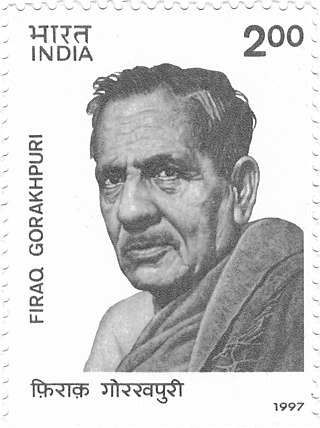
Raghupati Sahay, also known by his pen name Firaq Gorakhpuri, was an Indian writer, critic, and, according to one commentator, one of the most noted contemporary Urdu poets from India. He established himself among peers including Muhammad Iqbal, Yagana Changezi, Jigar Moradabadi and Josh Malihabadi.
Panchakshari Hiremath is a writer and poet, short story writer, essayist, critic, translator, orator, editor and freedom fighter who writes in Kannada, Urdu and Hindi. In 2005, he won the Sahitya Akademi Prize for Translation.

Rajinder Singh Bedi was an Indian Urdu writer of the progressive writers' movement and a playwright, who later worked in Hindi cinema as a film director, screenwriter and dialogue writer and he is grandfather to Rajat Bedi and Manek Bedi.
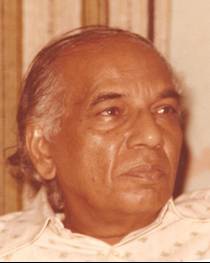
Syed Ali Jawad Zaidi was an Indian Urdu poet, scholar, and author of over 80 books in several languages. He was also an Indian independence activist, lawyer and later, a civil servant, but is best known for his work in Urdu literature.

Rajesh Joshi is a Hindi writer, poet, journalist and a playwright, who was the recipient of 2002 Sahitya Akademi Award in Hindi for his anthology of poems - 'Do Panktiyon Ke Beech', given by Sahitya Akademi, India's National Academy of Letters. He presently resides in Bhopal and continues to work as a freelance writer. His poems have been translated into English, German, Russian, Urdu and into many other Indian languages. Recipient of Muktibodh Puraskar, Makhan Lal Chaturvedi Puraskar, Srikant Verma Smriti Samman, Shikhar Samman and others.

Uday Prakash is a Hindi poet, scholar, journalist, translator and short story writer from India. He has worked as administrator, editor, researcher, and TV director. He writes for major dailies and periodicals as a freelancer. He has also received several awards for his collection of short stories and poems. With Mohan Das he received Sahitya Academi Awards in 2011. He is the first author to return his Sahitya Akademi award on September 3, 2015 against the killing of M. M. Kalburgi that initiated a storm of national protests by writers, artists,scholars and intellectuals.
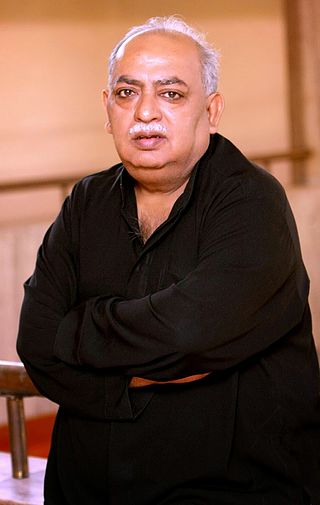
Munawwar Rana was an Indian Urdu poet. He was honoured with the Sahitya Akademi Award in 2014 for his poem Shahdaba.
Abhiraj Rajendra Mishra is a Sanskrit author, poet, lyricist, playwright and a former Vice-Chancellor of the Sampurnanand Sanskrit University, Varanasi.
Rahman Abbas is an Indian fiction writer and the recipient of the India's highest literary Award Sahitya Akademi Award for his fourth novel Rohzin in 2018. He is also the recipient of the two State Academy Awards for his third and fourth novels respectively i.e. Hide and Seek in the Shadow of God (2011) and the Rohzin in 2017. He is the only Indian novelist whose work in German has received a LitProm Grant funded by the German Federal Foreign Office and the Swiss-South Cultural Fund. He writes in Urdu and in English. His novels deal with themes of forbidden politics and love.
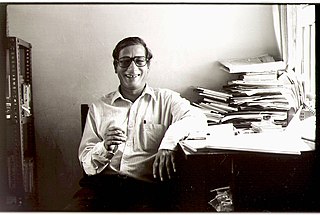
Manglesh Dabral was an Indian Hindi poet and journalist. He was associated with Hindi-language newspapers including Jansatta, Hindi Patriot, and Purvagrah. Some of his popular works include Pahar Par Lalten, Ghar Ka Rasta, and Kavi Ka Akelapan. He was a recipient of the Sahitya Akademi Award in 2000 for his anthology Ham Jo Dekhte Hain.
Jitendra Udhampuri is an Indian writer of Dogri, Hindi and Urdu literature. He is a recipient of the Sahitya Akademi Award in 1981. The Government of India honored him in 2010, with the fourth highest civilian award of Padma Shri.
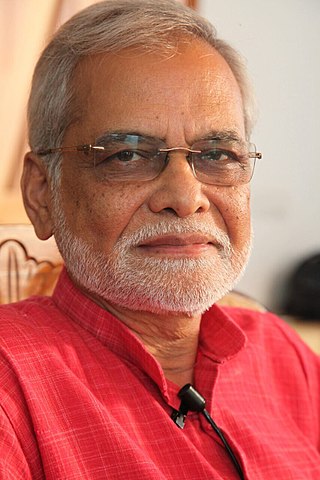
Mudnakudu Chinnaswamy is an Indian Kannada language poet, hailing from Mudnakudu village in Chamarajanagar district of Karnataka, India. He received Kendra Sahitya Academy award in 2022, for his work "Bahutvada Bhaaratha mattu Bouddha Thaatvikate".
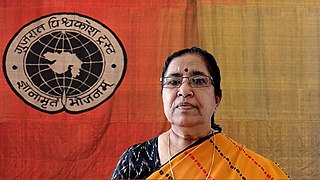
Sharifa Vijaliwala is an Indian Gujarati language writer, critic, translator and editor from Surat, Gujarat, India. She is a recipient of a 2018 Sahitya Akademi Award for Vibhajanni Vyatha, a collection of critical essays in Gujarati, and has won several Gujarat Sahitya Akademi awards for her literary work.

Sahitya Akademi Translation Prize or Sahitya Akademi Prize for Translation is a literary honour in India, presented by Sahitya Akademi, India's National Academy of Letters, given to "outstanding translations of creative and critical works" in 24 major Indian languages such as English, Rajasthani, Punjabi and the 22 listed languages in the Eighth Schedule of the Indian Constitution recognised by the Sahitya Akademi, New Delhi.
References
- ↑ "Sahitya Akademi Translation Prize 2013- News Letter" (PDF). Sahitya-akademi.gov.in. 22 August 2014. Retrieved 16 August 2022.
- ↑ "2 city writers bag Sahitya Akademi award". Times of India. 22 December 2016. Retrieved 22 December 2016.
- ↑ Sanjay Pande (22 December 2016). "'समालोचक हूं, उम्मीद न थी, मिला तो खुशी हुई'" (in Hindi). Navbharat Times.